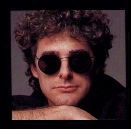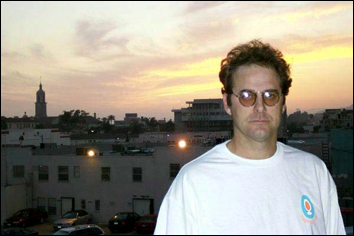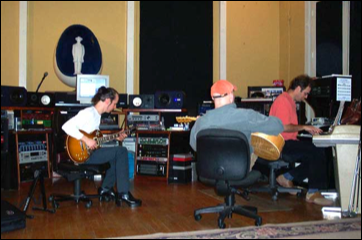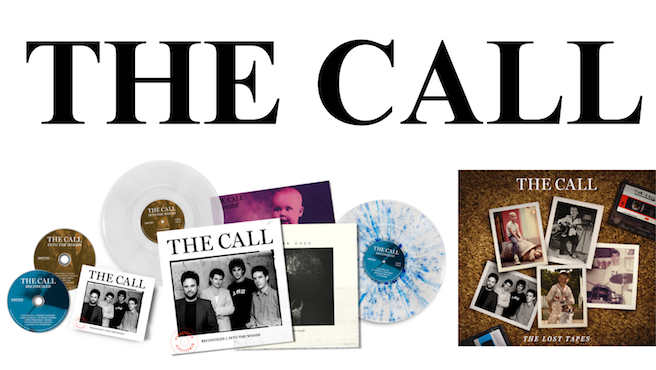
JIM GOODWIN- the interview (1989)
From this issue of Notified, it takes a personal look at Jim Goodwin, keyboardist for the Call. The music of the Call reveals Jim's talent for creating moods and nuances. Jim is an insightful and genuinely modest person. And while his musical career is taking off, his feet seem firmly planted on the ground.
WHO WERE YOUR MUSICAL INFLUENCES?
I was very much influenced by the classical rock stuff like Yes, Genesis with Peter Gabriel, Gentle Giant and a lot of jazz like the original Weather Report.
SO THOSE ARE YOUR ROCK ROOTS?
Well, prior to that, I had taken piano lessons when I was about 9 years old and I hated it. One of my very first lessons I learned the I-IV-V progression and it was weird really that the teacher was even teaching theory at all in this small town in Oregon were I was living. But I was to have learned all these songs in order to win these busts of the classical composers. So I learned the I-IV-V progression, but at that time to the I-IV-V was "Louie, Louie" and that's all I wanted to play. I would sort of rock on this thing and my mom would come in and say, "Jim, that's not what you're practicing." So I told her that I wasn't into this thing at all and that I hated it. So she let me quit. I played "Louie, Louie" for and tell in 3rd grade on this little Sears organ with my best friend who sang and played tambourine. That was my first ever gig. So I guess those are my rock roots. Then when I was about 14 I had this uncontrollable urge (to quote Devo) to play music and to take piano lessons. So I hooked up with my cousin in Portland who was taking lessons from this guy who taught theory more than any style of music. He taught you how to play the piano and have good technique and how to write music.
WAS IT AT THAT POINT THAT YOU DECIDED ROCK AND ROLL WAS WHAT YOU WANTED TO PLAY?
Actually, my sister introduced me to the whole rock and roll thing by taking me to a Chuck Berry concert when I was about 14 or 15. For some reason I can't remember, we arrived really late for the show and I was the only one without a ticket and my sister didn't want to buy me one since there were only about 30 minutes left of the show. So she and her friends left me outside the coliseum in Portland and all I heard was this great, loud rock and roll music when someone would open the doors. It really put the bug in me because it was behind these closed doors and it was just this power, this sound and it didn't have any image. I had also inherited my brother's record collection about that same time and he was really into Jimi Hendrix and Cream and I had loved them so much form the time I was very young.
More than anything though I loved Peter Gabriel and Genesis. Their very eclectic, progressive rock - - how they used flute, oboe, and lots of keyboards - - all this avant-garde instrumentation. They were my favorite band which is ironic because Michael, tom and Scott never knew who Peter Gabriel was. They had heard Genesis but it wasn't what they were into. So I was into all this classical rock and it's interesting really because I feel it's the one thing that defines my contribution to the Call.
Even though Michael also had a background in classical music, he and Scott were into rock and roll, blues, rhythm and blues, and even psychedelic music - - people like Muddy Waters, Chuck Berry, Dylan, the Band, and Moby Grape. All this straight ahead rock music and country western as well. And Tom played in blues bands from day one. So while I was listening to this classical rock stuff, at the same time in their lives they had been listening to and playing this really unpretentious, down-home music. I never had any of that blues band rock. I'm the complete antithesis of Tom in that regard. I never played the blues until we did the harry Dean Stanton shows. People have the notion that you can't really play music unless you have those blues roots. But I think you can - - it's just that you end up playing it differently.
ALL MUSICIANS ARE INFLUENCED BY WHAT CAME BEFORE BECAUSE EVERY GENERATION HAS CHRONICLED ITS MUSIC. THAT'S WHAT INSPIRATION IS - THE TORCH BEING PASSED.
Yeah, that's true and I feel this wide range of influence works well for the Call. Like Tom is really pretty traditional with his guitar work although he ends up with these weird sounds because we throw him into these non-traditional situations and he'll add this blues rock thing. Michael and Scott lay down this really honest, but unusual, rhythm section, and I'll add this thing that I grew up with - - a more melodic approach.
A LOT OF TODAY'S MUSIC RELIES TOTALLY ON THE TECHNICALLY SOPHISTICATED SYNTHETIC SOUND. ARE YOU PRETTY STATE-OF-THE-ART?
I try to avoid all that because it's so cliched and it wouldn't work well with the Call. We go toward more piano and organ sounds. I'm much more interested in the notes that I'm playing than in the sound. I'm not a technical keyboard player. I'm not a programmer. I don't use a computer. I don't sequence my stuff. I don't have state-of-the-art equipment by any means. What I do is play parts and to me melody is more important than the sound. I appreciate the great sounds, but I focus on performance and melody.
IT WAS FIRSTLY ON 1986'S RECONCILED THAT THE COLLABORATIVE SONGWRITING APPROACHES OF MICHAEL BEEN AND JIM GOODWIN WERE BEGINNING TO SHOW THEMSELVES. YOUR THOUGHTS?
The most wonderful thing to me about Reconciled was writing songs with Michael. It was such a surprise when he asked me if I had and songs to submit. I said, "Well, yes, as a matter of fact, I do." So I gave him a couple of keyboard melodies which eventually became "Tore The Old Place Down", and "I Still Believe". To me it was the beginning of the great opportunity of writing with Michael that has blossomed on Let The Day Begin. For me it's the ultimate situation because I'm not a real prolific songwriter and I'm not even really good at writing songs. I'm really good at coming up with a million little chord progressions and melodies. But I never know what to do with them. I just pump them out.
I think Michael is the songwriter I've been trying to find all my life because I've always wanted to collaborate with someone but no one has ever understood or appreciated or been able to hear what I've been doing. Michael is such a talented songwriter that all he needs is a spark of an idea and he'll come up with an entire format for a song out of it. And the band is so good at honing it down into a song that usually all it takes is just one line or chord progression. Scott's drumming is so great and Tom's guitar playing is truly brilliant.
DO YOU WRITE LYRICS WITH MICHAEL?
Not really. With Michael it's only to the extent he'll bounce lines off me and say, "What do you think works better" or "Do you think this is pretentious or vague?" And since we room together on the road, he'll be working on a lyric and he'll say, "What do you think about this?" but mostly I just let him go because he's so good at it. Lyrics are probably the hardest thing to write. I never even have to consider that the lyrics he will put to my music will be anything but great. I'm totally flattered that he can be inspired by my music to come up with the kind of lyrics he writes. I think the lyrics are by far the best on the new album. Michael said at one time he thought the song "When" is the song he's always been trying to write. To me that was the biggest compliment that I could get. I wasn't responsible for it, but in some small way I had contributed to get that song out of him. To be a part of this band is a total honor and a fortunate blessing for me.
People ask me what it's like playing with the Call or writing songs with Michael and I have to say that basically I feel if I had to name the ten best singer / songwriters in the history of rock and roll, Michael would be one of them. It would be like how you would feel if you had played with Jimi Hendrix or Jim Morrison. It would be the equivalent.
EVEN THOUGH MICHAEL'S LYRICS LEAVE PLENTY OF ROOM FOR INTERPRETATION, MANY OF THE CALL'S SONGS ARE INFUSED WITH RELIGIOUS CONNOTATIONS. WERE YOU BROUGHT UP IN A RELIGIOUS ENVIRONMENT?
My family was Presbyterian but it really wasn't stressed. My grandfather was a lunatic, fundamentalist bible-beating minister. And for a long time my father rejected Christianity because his father represented this Christian faith and to him it was all bull because of the manner in which he was raised. To him it was all just a lie. It was violent and hateful and he totally rejected it. My dad agreed to go with the Presbyterians because my mother insisted we go to church. So we had regular Sunday School and all that. But I was never really into it because of the rigid formality. When I was in high school I had this great philosophy teacher and we read all these philosophies and I sort of believed everything because there was no reason not to believe it and if it works that's great. That's what I liked about the basic ideas of Christianity, which is all my mother ever stressed, that we should forgive each other and be kind to one another.
WHILE DEEPLY CONCERNED WITH THE SPIRITUAL JOURNEY AND WITH THE POLITICAL AND SOCIETAL INEQUITIES, IT SEEMS THE CALL ARE CAREFUL NOT TO GET ON A SOAPBOX - - FEELING RATHER THAT SONGS SHOULD COMMUNICATE MORE IN AN ABSTRACT WAY. BUT IN ALL THE SONGS IT IS OBVIOUS: THE MESSAGE IS LOVE.
It's all about being human and taking care of each other. People need a much more practical approach in living with each other. I think the thing I'm most overwhelmed by in people in general is the fear that everyone lives with. The fear that we have of each other and our intense insecurities breed all this violence, aggression and machoism and every kind of hatred and racism. It's always been there and I think it will always be there unless people really start educating themselves to have a higher, elevated spiritual concept of life and living with people. It's part of the natural human condition. We're afraid of each other and so we build these fortresses.
YOU'VE BEEN WITH THE CALL FOR SIX YEARS. WHAT BANDS WERE YOU IN BEFORE JOINING THE CALL?
I toured with Sparks and I recorded and toured with John Cale. It was a strange thing really how I joined the Call. I happened to run into an acquaintance of mine who played bass who told me he was auditioning for the Call and I asked him if they needed a keyboard player and he said he though they did. I had heard the Call and really liked them. This was 1983 and "Walls Came Down" was having a lot of success. I called their management company and the receptionist said, "Yes. I think they are looking for a keyboard player", and gave me the number of the studio where they were recording Scene Beyond Dreams. When I called they said sorry we aren't looking for a keyboardist right now, but Michael told me to come on over anyway. So I did and we became acquainted and Michael took my number.
Their keyboardist was just temporary and as it turned out they had some difficulty with him and he left the band. They needed someone immediately as they were about to leave for Europe to tour with Peter Gabriel. So I hooked up at the last minute. I was pretty much in heaven on that tour because here I was playing with this great band and opening for Peter Gabriel who had been my favorite for years. We returned form Europe and finished Scene Beyond Dreams. After it was released it became pretty obvious Polygram was burying us, giving us no support whatsoever. So we were left with two years ahead of us without a record label.
We played some shows in California during the legal entanglements with Polygram to keep us alive. It was during one of those shows that a twist of fate dictated a change in the band. We had this date booked in San Francisco and our bass player, Joe Read, who had joined the Call when I did, decided to leave the band. We didn't have time to find a replacement so Michael said he would play bass since no one could learn the songs fast enough. Bass was Michael's first instrument and he and Scott played for years together with Michael playing bass. It was about halfway through the show when we realized that this was the best show ever. We all played better than we had ever played before. Tom played better because he was the only guitar player. Scott played better because he and Michael had played that way together for so long. And it suddenly made me feel like I understood what I was supposed to be doing. It was a lot clearer what I wanted and needed to do. Everyone's role became much more defined somehow and it felt good. So Michael said he would continue playing bass. And it was interesting because he's such a good guitar player, but he had no problem and he seemed to love playing bass and it sounded interesting, and it immediately became apparent that we suddenly had this distinct style because of his bass. He continued to play guitar on the albums as well as bass and now on stage I play keyboard bass when he plays guitar.
I FEEL "LET THE DAY BEGIN" IS PROBABLY THE PUREST EMOTIONAL RECORD THE CALL HAS RECORDED. HONEST, ROMANTIC DECLARATIONS MIXED WITH SOMETIMES UNSETTLING RELIGIOUS IMAGERY. AND WHILE THE CALL HAVE ALWAYS BEEN A LITTLE LEFT OF MAINSTREAM, THE NEW SINGLE, "LET THE DAY BEGIN" IS SO INFECTIOUS. IT'S WITHOUT A DOUBT A GREAT RADIO SONG.
Yes, it is, and we're pleased about that. But it wasn't a flagrantly commercial move to write a radio song - - it just happened. I can just hear some critic now saying something like, "the song is great but I expected more from Michael Been". Some critics have labeled him as a dark, brooding songwriter and while that is definitely a part of him it's not the whole picture. The song is upbeat but the words are very intense. This album is so completely live and recording it was a rejuvenating experience for all of us. We wanted that live sound on Into The Woods but we just came close. "In The River" and "I Don't Wanna" sound pretty live. We realized for this album we didn't need a fancy producer. We just needed someone to set us up in the studio.
We were in a large room with full concert monitors, with side fills and wedges for all of us and we just played loud. We play best loud and powerful. The only thing redone was the vocals. "Surrender" was completely live. Tom's guitar solos are completely live. I listen to Reconciled now and it's good, but if we could do it over the way we did this one, it would be ten times more powerful. I think Reconciled and Into The Woods led up to this album. For what it's worth, you always tend to look back and think "God, if we could do this and that over", but I don't think we would have gone through those steps to get there. When someone looks over the group's history, it will be an interesting body of work. A real progression.
WHAT ARE YOU LOOKING FORWARD TO RIGHT NOW?
I hope we have success with this album just so we can establish ourselves and work to our full capabilities, our full potential without having to go through these two year nightmares and being screwed around by the record company executives that don't have any idea what's going on. Unfortunately it's a fact of life in this business, but if you have a certain amount of success you can finally transcend some of that dependency on the record label because they become dependent on you. You're left alone. You've proven that what you're doing is successful and so you don't have to audition and you can get past them and just have them there to put out your record and keep your career going. I feel really productive on every level of my life. I'm at the time of my life where if I'm given any opportunity I'll seize it and try to make something out of it. Whereas back in Reconciled time if I'd been given an opportunity via that success I might have squandered the success and money in some kind of unproductive way.
We are all really anxious to get back on the road. It's our career and it's extremely important to us. The thing that has kept us going is how much we believe in this record, but two years is a long time. We all love touring. The people are wonderful, so completely open. And when you reflect back you realize all those moments are so great. Makes you feel good about what you're doing.
What music have you been listening to:
There’s a movie out called “Let’s Get Lost” about the life of Chet Baker, this trumpeter and singer from Oklahoma. I’ve always been fascinated by his work. I was first introduced to him in Paris when I played with the Gleaming Spires. He was in the audience one night and we asked him to come up on stage and play with us and he did. I have two tapes of his music that I’ve been listening to lately. One is the soundtrack from the movie and the other is a collection of the best of Chet Baker. It’s just the greatest, most romantic music in the world. I’ve also been listening to Tracy Chapman’s first record, and a new band from New Orleans called the Subdudes who are quite good; very cajon influenced, with lots of rhythm and blues and vocals.
Books you’ve read recently:
“Love, Medicine and Miracle’s” by Bernie Siegel. It’s all about how your mental attitude is manifested in your body. I’ve also recently read Kurt Vonnegut’s “Welcome to the Monkey House” and some Hemingway and Flannery O’Connor short stories.
Name a song you wish you had written:
“I Want To Know What Love Is” by Foreigner. I wish I’d written that song because it sounds exactly like something I would write. Not lyrically, but musically, in terms of chord progressions. Anyone who likes the Call’s music will hear that it sounds just like something I would write, especially the verses and choruses. When I first heard it I said “I should have written that song”, because it was just about to come out of me, but they did it first.
JIM GOODWIN - today


Jim runs his own company called Eggchair Music (http://www.eggchairmusic.com). Feel free to check it out.

